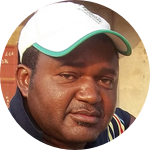About This Project
Biologists working with vulnerable species must be equipped with the latest skills to protect and restore wildlife and their habitats. University researchers in agroforestry and wildlife science will travel to Cameroon to assist and train local partners. This project will enhance monitoring programs and ensure that the Cameroonian biologists are equipped with the most advanced techniques for research and conservation.Ask the Scientists
Join The DiscussionWhat is the context of this research?
Mt. Bamboutos and the
Lebialem Highlands of Southwestern Cameroon are home to many critically endangered and threatened species. A few of these include: the Cross River Gorilla, Nigeria-Cameroon Chimpanzee, Drill, Bannerman’s Turaco, and Banded Wattle-Eye. Though these highlands are considered a priority area for conservation, they are under intense land use pressure from local people who depend upon their resources.
Realizing the need to conserve resources while maintaining local livelihoods, a partnership developed between Virginia Tech, Trees for the Future (TREES), Environmental and Rural Development Foundation (ERuDeF), and the Institute of Biodiversity and Non-profit Studies (IBiNS). Our joint mission is to contribute to the sustainable management of natural resources, protect endangered species, local economic development, and professional training. Virginia Tech researchers will be travelling to the project area to meet with our partners to carry out this mission.
The results of this project will drive continued conservation efforts in the Lebialem Highlands by developing our Cameroonian partners’ ability to achieve natural resources management objectives, while at the same time, enhancing the livelihoods of the local population
What is the significance of this project?
Supporting the project is particularly important because tropical forests are some of the most biologically diverse, yet poorly understood ecosystems in the world. The Lebialem Highlands provide some of the last refuge for the world’s great apes and this project will aid reforestation efforts in Cameroon.
Pertinent data will be collected and used to guide management decisions and conservation activities to protect and restore wildlife and their habitats. By supporting this research we will be able to assess and enhance monitoring programs and ensure that the Cameroonian biologists working on the front lines are equipped with the most advanced techniques for restoration, research, and conservation. In turn, these biologists can then train others in new techniques and create a self-sufficient system of education and action that will disseminate throughout the region and beyond.
What are the goals of the project?
The objectives of the trip are to:
- Determine the success of reforestation sites. This includes examining planting success, growth rates, and synthesizing economic benefits. We will assess and refine the capacity for small scale farmers to strengthen and implement agroforestry development programs, thus supporting sustainable livelihoods and natural resource management.
- Establish and expand monitoring and evaluation studies for conserving wildlife populations and their habitats. Examples include distance sampling point counts/transects for birds and non-invasive remote cameras trapping for mammals. With these techniques, biologists will be able to effectively monitor population level changes over time through sound and meaningful scientific methodologies.
- Aid professional development for conservationists in Cameroon. Virginia Tech researchers will help support the mission of IBiNS by providing professional training in conservation and sustainable development. This will allow for proper data collection and synthesis tied to the agroforestry and wildlife monitoring programs.
Budget
Research faculty from Virginia Tech and our partners with TREES, ERuDEF and IBiNS will be visiting several key research and conservation sites throughout the Lebialem Highlands of southwestern Cameroon. Contributed funding will be used to cover in country travel expenditures for the Virginia Tech and Cameroonian research teams.
The proposed budget is based on direct costs to conduct this research in Cameroon. The investigators draw no salaries and only expenditures while in Cameroon are requested. To ensure the success of this trip and to strengthen international partnerships we are asking for $2,774 to help cover expenses.
Endorsed by
Meet the Team
Team Bio
Michael and John have accumulated 40 years combined domestic and international experience working in the fields of wildlife science and forestry respectively. Michael’s specific areas of interest and specialties include: population dynamics; wildlife habitat and resource use; ornithology; mammalogy. John’s include: Private Forestland Stewardship; Agroforestry and Whole Farm Planning; Bioenergy and Family Forest Sustainability; Collaborative Conservation; Integrated Natural Resources Problem Solving. We feel our diverse yet overlapping backgrounds paired with our passion for sustainability and education will lead to long lasting impacts far beyond the scope of this project. In addition to our scientific interests, we both share a passion for playing music.Michael St Germain
My research interests include population dynamics and habitat use of wildlife. Although I have worked with an extensive array of flora and fauna his specialties include, birds, bats and other mammalian critters. I also enjoy the educational components associated with the university setting. Recently, I was able to combine my artistic background with my knowledge of wildlife by illustrating and coauthoring a book regarding the natural history of the Blue Ridge Mountains, and creating awatershed awareness mural in downtown Blacksburg, VA. http://cmi.vt.edu/News/art_StGermainCombinesArtScience.html
John Munsell
I joined Virginia Polytechnic Institute and State University in October of 2007. Prior to joining Virginia Tech, I attended the State University of New York's College of Environmental Science and Forestry where I earned my master's degree and Ph.D. in forest resources management. My work has included researching optimal management practices of non-industrial private forests in New York City's surface water supply system and studying drivers of agroforestry adoption and adaptation in the Mid-Atlantic and Appalachain Regions of the US and in Cameroon in Central Africa. I helped build a network of forest farming partners to augment research efforts and build information for producers and other stakeholders.
Additional Information
Research Team Websites:Virginia Tech: Department of Forest Resources and Environmental Conservation
http://frec.vt.edu/people/faculty/faculty_folder/munsell.html
Virginia Tech: Conservation Management Institute
http://cmi.vt.edu/
Environmental and Rural Development Foundation (ERuDeF)
http://www.erudef.org/
Institute of Biodiversity and Non-profit Studies (IBiNS)
http://www.erudef.org/index.php/ibins/about-ibins/presidentceo-welcome
Trees for the Future (TREES)
http://www.treesforthefuture.org/

Project Backers
- 41Backers
- 106%Funded
- $2,967Total Donations
- $72.37Average Donation


